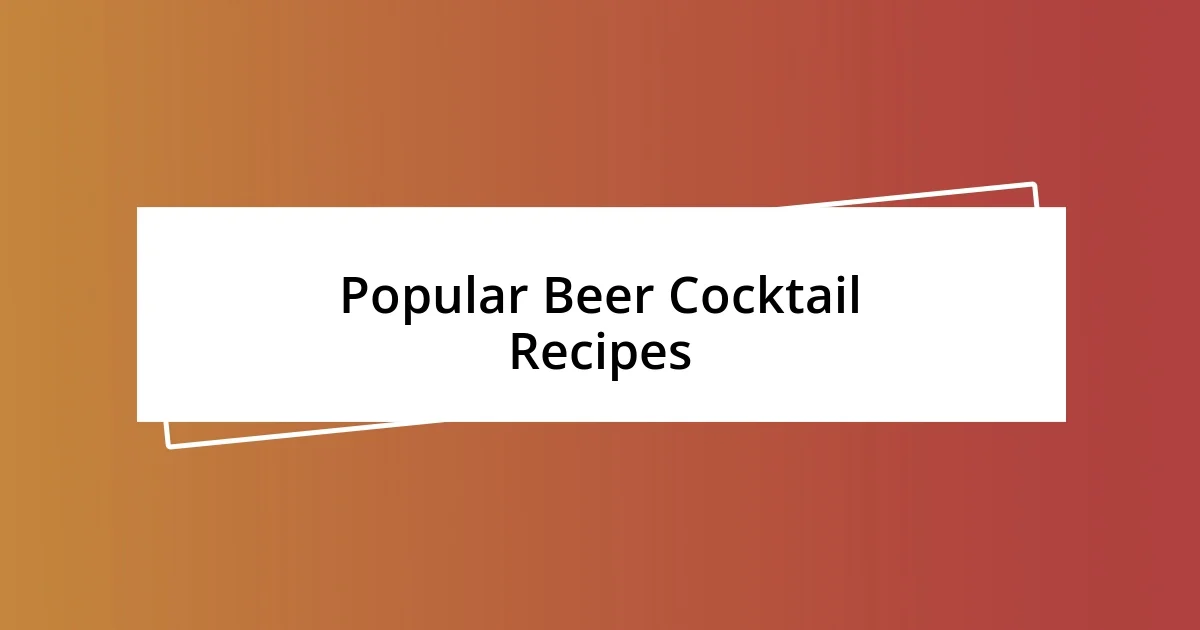Key takeaways:
- Beer cocktails allow for creative flavor combinations and evoke memorable experiences, enhancing social gatherings.
- Understanding different beer styles (e.g., lagers, stouts, IPAs) is essential for crafting unique cocktails, as each style contributes distinct flavors and characteristics.
- Using fresh ingredients, essential tools, and creative techniques (like layering and garnishing) can elevate beer cocktails and encourage experimentation.

Introduction to Beer Cocktails
Beer cocktails are a delightful blend of flavors, combining the robust essence of beer with various other ingredients to create something truly unique. I’ll never forget the first time I tried a shandy on a sunny afternoon; it was such a refreshing twist that it sparked my curiosity to explore even more combinations. Have you ever thought about how versatile beer can be?
From the simple mix of beer and lemonade to more intricate concoctions involving spirits and fresh herbs, the possibilities are endless. I often find myself experimenting in my kitchen, using whatever ingredients I have on hand. For example, I once added a splash of ginger beer to a citrusy shandy, and it transformed the drink into something completely surprising and refreshing.
Beer cocktails aren’t just about taste; they can evoke memories and feelings as well. Each sip tells a story, whether it’s a laid-back barbecue with friends or a cozy evening in with family. Isn’t that what makes crafting these drinks so enjoyable? When you engage with beer cocktails, you’re not just mixing drinks; you’re creating experiences.

Understanding Beer Styles
Understanding different beer styles is crucial for crafting unique beer cocktails. Each style brings its own set of flavors and characteristics. For instance, when I first encountered stouts, I was mesmerized by their rich, chocolatey notes. They transform a cocktail with just a splash, adding depth that can balance sweeter ingredients beautifully. Have you ever included a stout in your mixes? It can be quite a game changer!
A good rule of thumb is to consider the weight and intensity of the beer. Lighter beers, like lagers and pilsners, are great for refreshing cocktails that sip well on a hot day. I once used a crisp lager to create a vibrant beer margarita. It was a refreshing twist, and pairing the beer with zesty lime made it a hit at my backyard gathering. The lightness of the lager allowed the flavors to dance without overpowering each other.
In contrast, more robust beers like IPAs or porters can add complexity to a cocktail. Bringing these styles into the mix can create a wonderfully layered experience. I recall adding an IPA to a spiced rum concoction, and it opened up a whole new flavor profile that I never thought would work. The hoppy bitterness was surprisingly refreshing and balanced perfectly with the sweetness of the rum. Understanding these distinctions enables me to experiment with confidence.
| Beer Style | Flavor Profile |
|---|---|
| Lager | Crisp, clean, and refreshing |
| Stout | Rich, dark, with coffee and chocolate notes |
| IPA | Hoppy, bitter, with citrusy or floral notes |
| Pilsner | Light, slightly bitter, and smooth |
| Porter | Malty, toasty, with hints of caramel |

Essential Ingredients for Cocktails
When it comes to crafting delicious beer cocktails, having the right ingredients can truly elevate your mixology game. Beyond the beer, I find that fresh elements like fruits, herbs, and various mixers can make all the difference. I remember a summer night where I decided to experiment with mint and lime in a beer mojito. The coolness of the mint paired with the zest of the lime, along with a crisp lager, created a refreshing drink that was perfect for lounging on the porch with friends. Those simple touches made the cocktail feel special, transforming a basic recipe into something extraordinary.
Here are some essential ingredients that I recommend keeping on hand for your beer cocktail experiments:
- Citrus Fruits: Lemons, limes, and oranges add brightness and acidity.
- Fresh Herbs: Mint, basil, or even rosemary can provide aromatic depth.
- Sweeteners: Honey, simple syrup, or agave nectar for balancing flavors.
- Mixers: Ginger beer, tonic water, or soda enhance the drinking experience.
- Bitters: A few dashes can add complexity to your cocktails.
- Spirits: Vodka, gin, or rum can give an extra kick when used creatively.
Each ingredient plays a unique role, and I love to think of them as the supporting cast to the star—your chosen beer. The fun begins when you play with combinations, blending flavors to discover new favorites.

Tools Needed for Mixing
To mix up beer cocktails seamlessly, a few tools become absolute essentials in my kitchen. I never mix without a sturdy cocktail shaker; it’s perfect for blending ingredients and aerating the drinks. I still remember the first time I shook up a dark beer cocktail—it felt like a magic show as I watched the ingredients come together with icy precision. Do you have a favorite shaker? Trust me; it makes all the difference!
Another tool I find indispensable is a jigger. Accurate measuring is key to achieving that perfect balance of flavors. I once went a bit overboard with gin in a beer twist on a classic cocktail, and while it was still drinkable, it wasn’t what I intended! A jigger keeps things precise, sparing me the need to second-guess my measurements when I’m layering flavors.
And let’s not forget a good strainer; having one handy ensures a smooth pour without unwanted bits floating into the glass. I recall a time when I didn’t use one and ended up with an unwelcome mint leaf surprise in my beer mojito. What a turn-off that was! Investing in these tools elevates my cocktail-making experience and helps me put out drinks that I can truly be proud of.

Techniques for Mixing Drinks
Mixing drinks is an art, and I’ve learned several techniques that truly enhance the experience. One of my favorite methods is layering ingredients. For instance, when I crafted a beer cocktail with stout and a fruity lager, I poured slowly to create distinct layers. The visual appeal was striking, and that first sip, with flavors gently merging, was nothing short of delightful. Ever tried it? It’s like a surprise party for your taste buds!
Shaking or stirring can also change the game. When I shake up a drink, I love to feel the chill of the ice and watch the condensation form on the shaker. It’s exhilarating! I remember experimenting with a spicy beer margarita; the vigorous shaking brought the heat of jalapeños to life, creating a bold flavor that perfectly complemented the cold beer. Can you feel the anticipation when you know that perfect blend is just moments away?
Lastly, garnishing can elevate even the simplest cocktail. I’ve discovered that a simple sprig of rosemary can transform a basic beer cocktail into something elegant. One summer evening, I added a rosemary garnish to a beer and tonic mix, and the aroma made the drink instantly inviting. It’s those little touches that not only enhance flavor but also create a memorable presentation. What garnishes do you enjoy using? Trust me, they make a significant difference!

Popular Beer Cocktail Recipes
Many beer cocktails have gained popularity for their unique flavor combinations that surprise and delight. One of my all-time favorites is the Michelada—a zesty blend of beer, lime juice, hot sauce, and spices. I remember the first time I sipped one on a warm summer day; the tangy flavor paired with the cold beer was nothing short of blissful. Have you tried one? It’s a terrific way to kickstart any gathering!
Another captivating beer cocktail is the Shandy, which mixes beer with lemonade or soda. I still fondly recall a picnic where a friend introduced me to this refreshing drink. The crispness of the beer combined with the sweetness of lemonade created an explosion of flavors that was incredibly enjoyable. I often experiment with different citrus sodas, each time uncovering a new twist—like adding grapefruit soda for a tart kick. Isn’t it fun to discover new variations?
Let’s not overlook the classic Beer Margarita! When I first blended tequila with a light beer and lime, I was amazed by how the two spirits balanced each other. The lightness of the beer perfectly softens the boldness of the tequila, creating a drink that feels luxurious but incredibly refreshing. I still remember toasting with friends as we basked in the sun, each sip bringing smiles all around. What are your go-to beer cocktails that bring back fond memories?

Tips for Experimenting Creatively
When I dive into mixing beer cocktails, I find that harnessing unexpected ingredients can be a game-changer. For example, one evening, I decided to experiment with a spicy ginger beer paired with a fruity IPA. The result was pure magic—the heat complemented the hoppy notes beautifully. Have you ever combined flavors that you thought would clash but instead harmonized? It’s those surprises that keep the creative process thrilling!
Playing with different textures can also spark creativity. I once added a splash of creamy coconut milk to a dark beer cocktail, and the silky smoothness took me by surprise. It transformed a standard drink into something luxurious and tropical. Isn’t it delightful when a simple tweak can elevate your cocktail experience? It’s moments like these that remind me of how much fun it is to think outside the box.
Lastly, I encourage you to consider seasonal ingredients. One winter, I crafted a beer cocktail with cinnamon and apple cider, which echoed the cozy vibes of the holidays. It was like a warm hug in a glass! I often reflect on how using what’s fresh and in season can inspire unique blends. What seasonal flavors do you gravitate towards that might bring a new twist to your cocktail journey? Embracing these challenges not only improves your skills but makes the whole process far more enjoyable!














